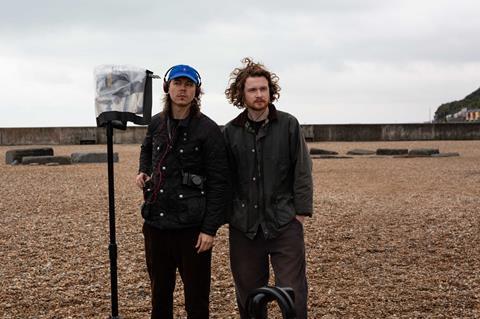
Misper, the debut feature by UK filmmaker Harry Sherriff, is about the sudden disappearance of an employee at a once-grand seaside hotel and the impact it has on her co-workers.
Described by Sherriff as a riff on the true-crime genre, the film blends elements of thriller, horror and dark humour and is now making its world premiere out of competition at the Edinburgh International Film Festival this week.
Misper was written by Laurence Tratalos who first worked with Sherriff on short film that played a key role in helping the latter secure a place at the National Film and Television School (NFTS).
The two co-founded their production company, Fresh Orange Productions, with Manchester-based entrepreneur Simon Orange, with the aim of making “uncompromising, bold British cinema that resonates with both local and global audiences”.
Orange, brother of Take That pop star Jason Orange, helped to bring in the private financing that supported the company’s first film.
Newcomers Samuel Blenkin and Emily Carey star while Tratalos produces for Fresh Orange and Tom Leatherbarrow. Orange is an executive producer.
The film shot for 20 days on location in Folkestone in September 2024.
Sherriff and Tratalos talk to Screen about filming in a terrifying basement, combining inspiration from international filmmakers with British humour and why they do not want to explain what the film’s title means.
Misper uses dark humour to amplify tragedy. What or who were your filmmaking references for your debut film?
Sherriff: For Misper, Laurence and I wanted to do Michael Haneke but with this British deadpan comedy. We spoke a lot about Roy Andersson, Ruben Ostlund and Aki Kaurismäki and Mike Leigh. Yorgos Lanthimos is someone that I’m always looking to. The filmmakers that we both love are very darkly funny.
Tratalos: Chris Morris and his humour.
Sherriff:. Tone is something we’re always talking about and we’re fascinated with. Laurence and I were very careful about not making the wrong joke. It’s a story about a missing person, a very serious issue, but we were trying to root it in this absurdist truth of how people react to a crazy, dark thing that’s happened.
Given the nuanced tone, how easy was it find your two leads, Samuel Blenkin and Emily Carey?
Sherriff: At the National Film and Television school, one of the first projects we did together we got to pitch to professional casting directors. [Through this] we met Verity Naughton and got on really well and stayed in touch. She was a big part of pushing us and being ambitious for going after people.
Tratalos: There’s a Ben Wheatley quote ‘write it dark and cast it funny.’ That was something we always wanted with all actors, those who could do the comedy as well.
Harry, what kind of director are you?
Sherriff: I’m a worrier up until we shoot. A lot of film directors say they enjoy the edit the most. And some directors say they love the pre-production because you can dream at that point and anything’s possible. But for me, I actually like the production, because that’s the doing, you’re capturing the film.

What was the most challenging moment on set?
Sherriff: The driving scenes were tricky, because we had to schedule Emily walking along the coast road to the bus and needed to get the shot at exactly the right time. We were literally three minutes away from the light completely going and not getting that great shot.
Tratalos: The only day that was tricky was the one shooting the basement scenes, just because it was strange down there and creepy. We only found that location when we were recc’ing the hotel.
Sherriff: The basement was actually scarier in real life. On screen it’s creepy but in real life, I was like I need to get out of here. This is terrifying.
What do you want audiences to take away from the film?
Sherriff: We wanted to make a film that made people laugh and think. It’s a unique take on the true crime genre. True crime is very insensitive, traditionally presented like a Sudoku puzzle, and it’s all just about clues, and there’s no feelings. The big thing for us was, let’s focus on the feelings and not make a bog standard procedural.
The title is a strange one. To what does ‘Misper’ refer?
Tratalos: In the script, we had an explainer but we decided not to use it on screen.
Sherriff: I like it, it gives audiences homework. They get out of the screening and they’ll search ‘misper’ if they don’t know. As time goes by in two, three years with so much true crime content and Netflix and what have you, people will know what misper means.

























No comments yet